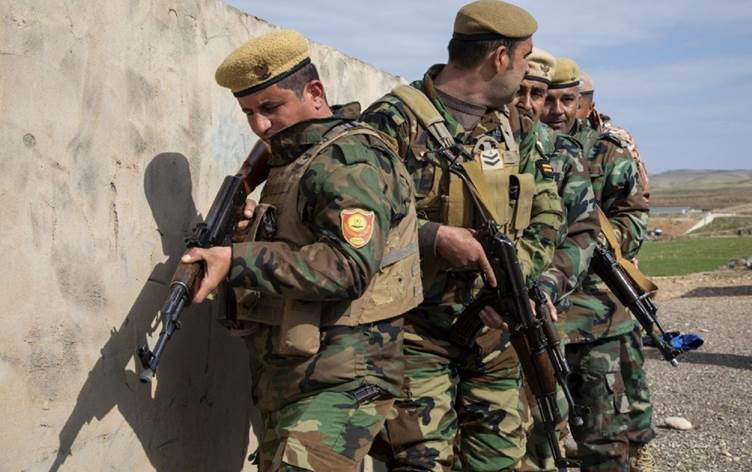ERBIL, Kurdistan Region – The US-led coalition will resume military training for Peshmerga forces in the Kurdistan Region by the end of May, a coalition spokesperson told Rudaw on Sunday.
“All trainings for Peshmerga forces are halted for now due to coronavirus, but there are ongoing talks between the coalition, NATO and Kurdistan Region Government (KRG) to resume the trainings by end of next month,” Colonel Myles B.Caggins III told Rudaw Radio.
Coalition forces have been in Iraq since 2014 to train and advise Iraqi and Kurdish forces in the fight against the Islamic State (ISIS). Over the border, they have also partnered with the Kurdish-led Syrian Democratic Forces (SDF).
The North Atlantic Treaty Organization (NATO) agreed in 2018 to launch a training mission in Iraq involving around 500 troops with the aim of building up the country’s armed forces so they could better fight ISIS.
However, following the US drone strike on January 3 which killed top Iranian general Qasem Soleimani at Baghdad airport, the Iraqi parliament passed a non-binding resolution demanding the expulsion of all foreign forces.
Iraq decided in January to review its security relationship with the US-led coalition by attempting to reach a new security agreement with NATO.
“The trainings will be resumed as the threat of Daesh is still high in the area,” Caggins added, referring to ISIS by its Arabic acronym.
ISIS has increased its insurgent activity in recent weeks, with militants killing an Iraqi federal police officer at a checkpoint in Hawija, western Kirkuk late on Sunday.
This was the third deadly attack on Iraqi and Kurdish security forces in the disputed territories in the past week.
Two Peshmerga fighters were killed and another wounded in an ISIS attack in Kolajo in the Garmiyan area on Tuesday night. Two Popular Mobilization Forces (PMF) fighters were also killed near al-Sadeq (Haliwa) military airport in Tuz Khurmatu on Thursday.
The attacks come as coalition troops have scaled down their presence in military bases across Iraq, citing the success of local forces in fighting the terror group.
In the space of a month, the coalition has handed over control of six military bases to the Iraq Security Forces (ISF), including Abu Ghraib near Baghdad, K1 in Kirkuk, al-Qaim near the Syrian border, Qayyarah in western Iraq, al-Sqoor in Mosul, and Al-Taqaddum in Anbar.
However, Vice President of the Kurdistan Region Jaafar Sheikh Mustafa told Rudaw Radio on Sunday that ISIS is stronger than any time since its military defeat in December 2017.
“ISIS is stronger than ever before since its defeat in December 2017, as now they control land and have military weapons that enable them to track movements of security forces at night,” Mustafa said.
“ISIS is present in almost all areas all the way from Harmin to the Syrian border,” he added.
ISIS was declared territorially defeated in Iraq in December 2017. However, a low intensity insurgency has continued in Iraq, exploiting security vacuums between rival forces.
Iraq’s disputed territories, which Erbil and Baghdad have long contested, and some western Sunni-majority regions including Anbar, have seen a recent uptick in insurgent activities, including bombings, ambushes, kidnappings, extortion, and arson.
Mustafa confirmed to Rudaw that ISIS are even conducting military trainings in areas of the disputed territories between Erbil and Baghdad.
“The withdrawal of coalition troops from disputed areas, spread of coronavirus pandemic, and Iraq’s internal issues have strengthen ISIS in Iraq,” Mustafa added.
The recent wave of ISIS attacks also comes as the US and the international anti-ISIS coalition draw down and consolidate their missions in Iraq and Syria.
The reduced military supervision could present ISIS remnants in Iraq and Syria with a unique opportunity to launch more frequent attacks and expand their influence, particularly in Iraq’s disputed territories.
Jabar Yawar, chief of staff at the Ministry of Peshmerga Affairs, says the ISIS resurgence has been underway for some time.
“According to our data, the group increased its activities in 2018 and 2019, especially in Kurdistani areas outside of the Kurdistan Region administration, including Diyala, Hamrin, Kirkuk, Tuz Khurmatu, and Qarachogh. In Qarachogh, they even established bases,” Yawar told Rudaw on Thursday.
The latest Pentagon Inspector General report, covering October 1 to December 31, said ISIS remnants of the group are still active, capable of conducting small-scale attacks.
“ISIS maintained both freedom of movement and the ability to hide and transport fighters and materiel in rural areas where [the Iraqi Security Forces] presence is less intense and ISIS can more easily avoid detection and capture,” the Lead Inspector General report said.
“ISIS retains enough manpower and planning capabilities to conduct regular small-scale attacks or ambushes against the ISF, the PMF, or local civilians accused of aiding the ISF or informing on ISIS activities.”

